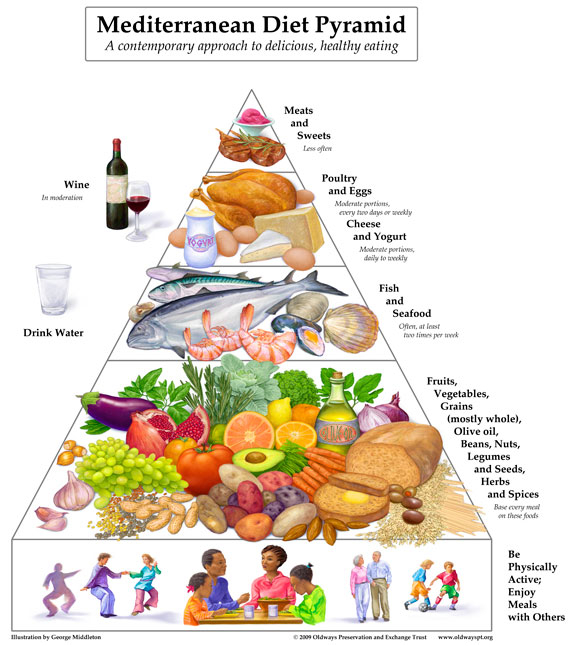 Extensive studies since the 1940’s have examined the hypothesis that Mediterranean eating patterns contribute directly to improved health outcomes. From this research emerged the concept of a Mediterranean Diet and the development of the pyramid plan for eating.
Extensive studies since the 1940’s have examined the hypothesis that Mediterranean eating patterns contribute directly to improved health outcomes. From this research emerged the concept of a Mediterranean Diet and the development of the pyramid plan for eating.
All Frontier Soups products belong to the essential and dominant food category in the Mediterranean Diet Pyramid.
Dietary data from the parts of the Mediterranean region that in the recent past enjoyed the lowest recorded rates of chronic diseases and the highest adult life expectancy are characterized by a pattern similar to the one illustrated in the list below. The healthfulness of this pattern is corroborated by more than 50 years of epidemiological and experimental nutrition research. The frequency and amounts suggested are in most cases intentionally nonspecific, since variation was considerable. The historical pattern includes the following (several parenthetical notes add a contemporary public health perspective):
- An abundance of food from plant sources, including fruits and vegetables, potatoes, breads and grains, beans, nuts, and seeds.
- Emphasis on a variety of minimally processed and, wherever possible, seasonally fresh and locally grown foods (which often maximizes the health-promoting micro nutrient and antioxidant content of these foods).
- Olive oil as the principal fat, replacing other fats and oils (including butter and margarine).
- Total fat ranging from less than 25 percent to over 35 percent of energy, with saturated fat no more than 7 to 8 percent of energy (calories).
- Daily consumption of low to moderate amounts of cheese and yogurt (low-fat and non-fat versions may be preferable).
- Twice-weekly consumption of low to moderate amounts of fish and poultry (recent research suggests that fish be somewhat favored over poultry); from zero to four eggs per week (including those used in cooking and baking).
- Fresh fruit as the typical daily dessert; sweets with a significant amount of sugar (often as honey) and saturated fat consumed not more than a few times per week.
- Red meat a few times per month (recent research suggests that if red meat is eaten, its consumption should be limited to a maximum of 12 to 16 ounces [340 to 450 grams] per month; where the flavor is acceptable, lean versions may be preferable).
- Regular physical activity at a level which promotes a healthy weight, fitness and well-being.
- Moderate consumption of wine, normally with meals; about one to two glasses per day for men and one glass per day for women. From a contemporary public health perspective, wine should be considered optional and avoided when consumption would put the individual or others at risk.
Source: Oldways
